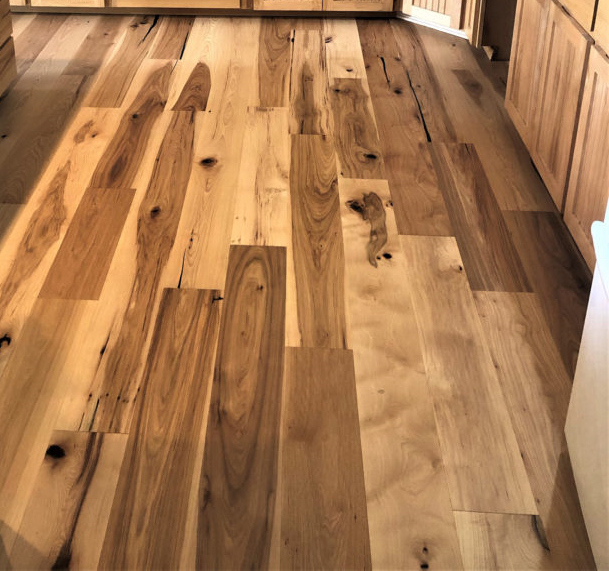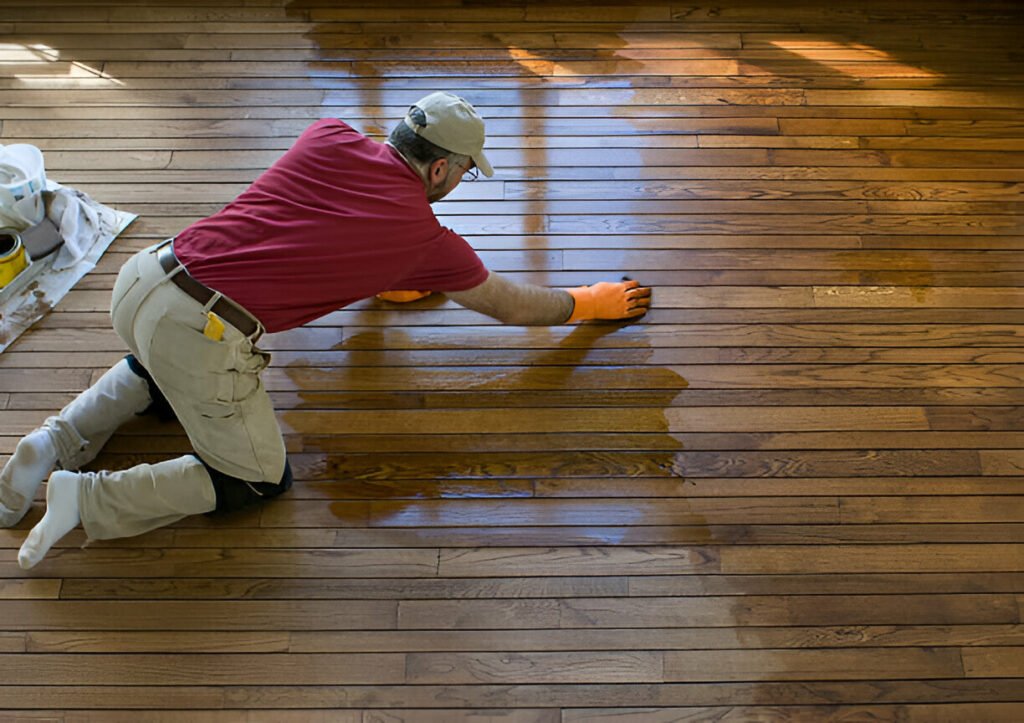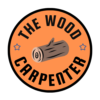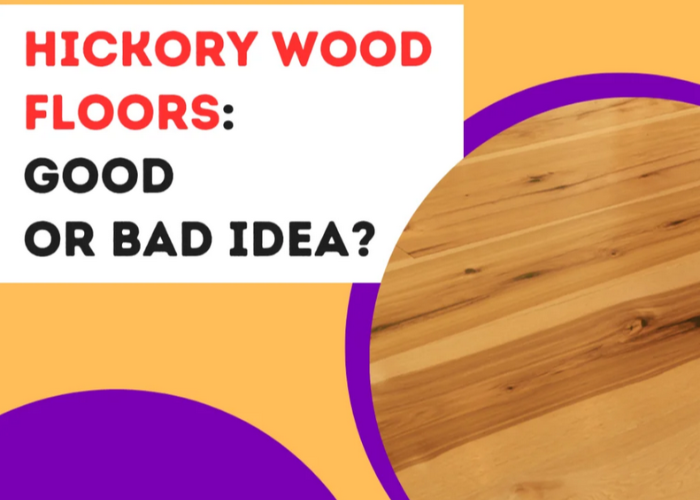Hickory Wood Floors
For years, people have argued about whether hickory wood floors are a good idea. These floors are famous for being tough and having cool patterns in the wood. But, like anything else, there are good things and bad things about them. In this article, we’ll talk about the Pros and Cons of hickory wood floors to help you decide if they’re right for your home.
Pros of Hickory Wood Floors
Hickory wood floors are prized for their incredible durability, making them perfect for areas with lots of foot traffic, like hallways, living rooms, and kitchens.
They can handle the hustle and bustle of everyday life, including households with active kids and pets. Plus, with the right care, solid hickory flooring can last for decades, adding value to your home.
But durability isn’t the only benefit of hickory flooring. It’s also highly resistant to water, making it a smart choice for various climates and environments. While no hardwood is entirely immune to water damage, hickory holds up better than many others.
For areas where moisture is a concern, you might consider engineered hardwood with a plywood core for added stability and moisture resistance.
In terms of looks, hickory flooring is a real standout. Its unique grain patterns and color variations, ranging from pale yellow to reddish-brown, give it a distinctive and rustic charm. Knots and other natural features add depth and character, setting it apart from more traditional options like oak or maple.
Whether you prefer wide plank styles or hand-scraped finishes, hickory flooring can create a visually stunning atmosphere in any room.
Another great thing about hickory wood is its versatility when it comes to staining and finishing. You can customize the color of your flooring to match your personal style and home decor perfectly.
With a wide range of stain options available from market, you can achieve the ideal look for your space, striking the perfect balance between hickory’s natural beauty and your desired aesthetic.

Also read: How Long Does Wood Stain Take To Dry ?
Discover the Power of Beeswax Wood Finish: Enhancing Wood naturally
Cons of Hickory Wood Floors
While hickory flooring has lots of good things about it, it’s important to know that it also has some downsides. Here are a few things to think about before choosing hickory flooring:
Unique Look: Hickory flooring has a special look with its grain patterns and marks. Some people really like this because it adds character to their home. But others might not be so keen on the unique appearance. It’s all about personal taste and what you think will look best in your space.
Wide Planks: Hickory flooring usually comes in wider planks instead of narrower ones. If you prefer a more traditional or modern style with narrower planks, hickory might not be the best choice for you.
Higher Cost: Hickory flooring can be more expensive compared to other types of hardwood like oak or maple. This is because there aren’t as many hickory trees available, so the demand is higher, which drives up the price. However, it’s still cheaper than fancier hardwoods like Mahogany or Rosewood, so you can get a cool look without breaking the bank.
Tricky Installation: Hickory wood is really hard, which is great for durability, but it can make installing it a bit tough, especially if you’re doing it yourself. Cutting and sanding hickory flooring is harder compared to softer woods, so it’s often better to hire a professional to make sure it’s done right. Pros know how to handle the wood properly to avoid problems like warping later on.
Comparison with Other Flooring Options
| Aspect | Hickory Wood Floors | Oak Wood Floors | Engineered Wood Floors |
| Durability | Highly durable, ranks among the hardest domestic hardwoods | Durable, but not as hard as hickory | Varies depending on the quality of the top veneer and core layers |
| Aesthetic Appeal | Distinct appearance with prominent grain patterns and natural color variations | Versatile, with a range of color options and a more consistent grain pattern | Can mimic the look of hardwood but may lack the authenticity of solid wood |
| Installation | Can be challenging due to the density of the wood, requires specialized tools and expertise | Relatively straightforward installation process | Generally easier to install than solid wood floors, especially with click-lock systems |
| Maintenance | Regular cleaning and maintenance required to preserve appearance and durability | Similar maintenance requirements to hickory wood floors | Maintenance needs depend on the wear layer and core materials |
| Cost | Generally higher cost due to superior durability and longevity | Moderately priced, varies depending on grade and finish | Can be more affordable than solid wood floors, especially for high-quality options |
Maintenance Tips

To maintain the beauty and integrity of hickory wood floors, homeowners should adhere to regular cleaning and maintenance routines. Sweeping or vacuuming regularly to remove dirt and debris can prevent scratches, while using a damp mop with a mild wood floor cleaner can effectively clean the surface without causing damage. Additionally, placing felt pads under furniture legs and using area rugs in high-traffic areas can help minimize wear and tear.
Conclusion
To sum up, whether hickory wood floors are right for you depends on what you like and what matters most to you. Hickory floors are super durable and look really cool, but they might not be the cheapest or easiest to take care of. By thinking about the pros and cons things we talked about in this guide and talking to flooring experts, you can figure out if hickory floors are a good fit for your home.
FAQs (Frequently Asked Questions)
1. Are hickory wood floors suitable for kitchens and bathrooms?
While these wood floors can add warmth and character to kitchens and bathrooms, it’s essential to take precautions to protect them from moisture damage.
2. How often do hickory wood floors need to be refinished?
The frequency of refinishing hickory wood floors depends on factors such as foot traffic and maintenance routines but typically ranges from every 7 to 10 years.
3. Can hickory wood floors be installed over radiant heating systems?
Yes, it can be installed over radiant heating systems, but it’s essential to follow manufacturer guidelines and consult with a professional installer.
4. Do hickory wood floors fade over time?
Like any wood flooring, hickory floors may experience some color changes over time due to exposure to sunlight and other environmental factors, but proper maintenance can help minimize fading.
5. Are hickory wood floors pet-friendly?
Yes, hickory wood floors are known for their durability and resistance to scratches, making them an excellent choice for homes with pets.
Also read: Hickory Wood: Everything You Need to Know

